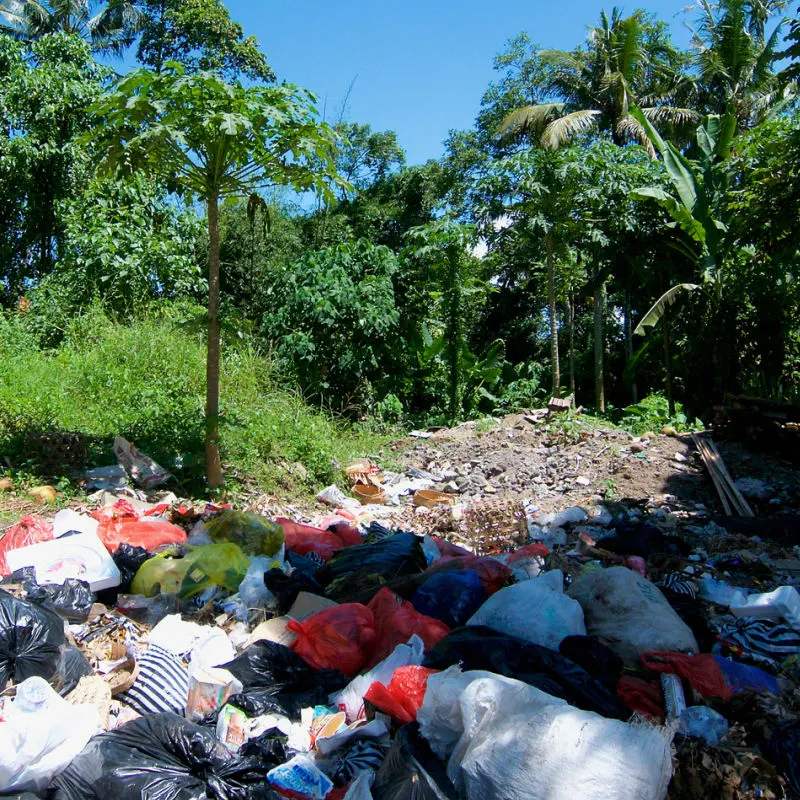Bali may be known as one of the most beautiful travel destinations in the world, but the island has also hit the headlines over the last few years for other reasons.
Bali’s issues with waste management and ocean plastic are well documented; as huge efforts are underway to make positive changes, the size of the problem is mounting up in more ways than one.

While communities, businesses, NGOs, and local authorities all work to clean up polluted rivers, tackle illegal landfills, and remove ocean plastics from beaches, the costs of doing so continue to rise.
Yet, in the grand scheme of things, the level of investment needed is a drop in the ocean compared to potential losses to Bali if the problems are solved soon.
The co-founder of one of Bali’s most impactful environmental NGOs, Sungai Watch, has spoken to reporters about the level of investment needed to eliminate illegal landfill and river pollution in Bali for good.
Gary Bencheghib was born in France and has spent most of his life in Bali. He and the incredible Sungai Watch team have done a remarkable job at bringing the issues that surround Bali’s waste management processes to public consciousness.
Not only does Sungai Watch remove waste from Bali’s rivers, beaches, and illegal landfill sites, but it sorts every single piece of material at a series of dedicated facilities across the island.
What can be recycled is recycled; what can be reclaimed, reused, and repurposed is put to new use, and Sungai Watch works with innovators to give new life to what is considered simply waste.
Top 5 Travel Insurance Plans For 2023 Starting At $10 Per Week
Easily Earn Points For Free Travel
The Sungai Watch team removes around 6,000 lbs of plastics from rivers and illegal landfills every day. This waste is then sent to one of the seven community-based processing facilities.
There are five more processing facilities set to open soon. Sungai Watch has an incredible track record, removing up to 90% of waste from some of Bali’s most polluted rivers, and they are showing no sign of slowing down.
Bencheghib has revealed that there is a solution to Bali’s waste management issues. It is estimated that 90% of ocean plastic that washes up in Bali comes from local waterways.
Bencheghib says that with 100 local processing facilities dotted across Bali, Sungai Watch would be able to divert the waste that is currently ending up in illegal landfills.
He estimates that it will take USD 40 million over the next three years to eliminate the illegal landfills in Bali and direct that waste to Sungai Watch’s localized processing facilities.
With USD 150,000 per site per year for the next three years, organizations like Sungai Watch, with support from the community and the authorities, could make illegal landfill sites a thing of the past.
@hairbykatieskinner Bali beaches 🤢 #Bali #balibeach #littering #fyp ♬ original sound – HairByKatieSkinner
Bencheghib told reporters, “This is really just disaster relief for the next two, three years, going in and closing every open dump.”
Sungai Watch shares the stories of their world all over Bali on their social media pages.
Footage of an illegal landfill in North Bali went viral last month; the shocking footage gave many Bali lovers their first glimpses of the true extent of the issues at play.
@freelance_amy Reslly hoping Bali resumes their plans to ban single use plastic now we are post pandemic 😥🤞🏻 #bali #oceanpollution #balibeaches #beachcleanup #oceanwaste ♬ Oceans (Hillsong United Remix) – FOA Rockout
Although the necessary investments in waste management may seem huge at first glance, it is a drop in the ocean compared to the costs incurred by a loss of tourism due to pollution and poor waste management.
While leaders in Bali are working to diversify the province’s economy and move towards a more ‘dignified’ and ‘sustainable’ model for mass tourism, the island is still heavily dependent on tourism revenue, and a more diverse economic model cannot be implemented overnight.
Investment in and support for environmental conservation and efficient waste management systems is essential for tourism to be able to survive in Bali long term.
Politicians in Bali have suggested that the new tourism tax, due to be introduced in mid-2024, should be spent on tackling plastic pollution on the island.
The Governor of Bali, Wayan Koster, first announced that the tourism tax will be used to support the preservation of Balinese culture and the environment but has yet to outline a specific budget for how tourism tax revenue will be spent.
Remove All Ads & Unlock All Articles… Sign up for The Bali Sun Premium

Plan Your Bali Holiday:
Book The Best English Speaking Drivers For Airport Transfers & Tours
Choose From Thousands of Bali Hotels, Resorts, and Hostels with Free Cancellation On Most Properties
Book Cheap Flights To Bali
Don’t Forget Travel Insurance That Covers Medical Expenses In Bali
For the latest Bali News & Debate Join our Facebook Community
SUBSCRIBE TO NEW POSTS
Enter your email address to subscribe to The Bali Sun’s latest breaking news, straight to your inbox.
Discover more from The Bali Sun
Subscribe to get the latest posts sent to your email.

Julie
Tuesday 8th of August 2023
Yes visa and new taxes need to be spent on 1. Roads. New roundabouts in bottleneck locations etc 2. Rubbish collection. And processing. For eg. After bad weather Mertasari beach had heaps of plastic bottles etc on water line and was not a beach to swim in. 3. People burn off plastic everyday near hotels etc and it's putrid smell. 4.Parking 5.introduce subsidies for locals to trade in petrol motorbikes. Scooters and cars for electric. Locals will also make more $ Charging stations need to provide near free charging by being run by sustainable energy. 6.more solar panels and storage batteries
Tourists hate. Traffic jams. Rubbish. Etc
We personally this 8 week trip chose not to venture to Canggu etc Took 1.5 hours to get from Sanur to Seminyak. No further trips there.
Love development and the tourists who now hate places can move to other more natural environments spreading tourist $ around the island not just a few areas.
Frustrated too
Sunday 6th of August 2023
The 3 r's of local government - roads, rates and rubbish. If you can't effectively manage these you shouldn't be in government
joe
Sunday 6th of August 2023
If you want to see how things work here. Go and sit at one of these Cocomarts in the chairs with tables out front. One after another arrogant cigarette smoking local guys come, eats some junk food smokes, and leaves his trash. A local family with a few little kids does the same thing. The thought of disposing of their waste never even enters their mind. Then the next person does the same thing. After a while there is a pile of trash that anyone of them will explain 'It's not my trash'. The schools here teach absolutely nothing. Except to march like a soldier and speak the national language. Anything they bought and opened is left where they opened it. Until this changes at the root of the problem, this is place is headed for hell. In twenty years, Indonesia's population has increased an estimated 60 million people. Thats a lot of diapers in the streams. The wild dog problem continues unabated. Its an endless mating season all over Bali Something here doesn't add up.
JoKer
Saturday 5th of August 2023
Local people and govt should have found ways to solve this problem years ago.
Robert
Saturday 5th of August 2023
Thailand had similar trash pollution 20 years ago but they solved the problem. It must start at village level, collection at every house, sorting facilities staffed by unemployed. Land set aside for landfill, recycled materials transported to regional collection points. Education in schools about separating trash at the source, no contamination with organic waste. Promote alternatives to plastic bags. Penalties for illegal dumping. Educate for pride in a clean environment, understanding the value to the economy. It is possible.